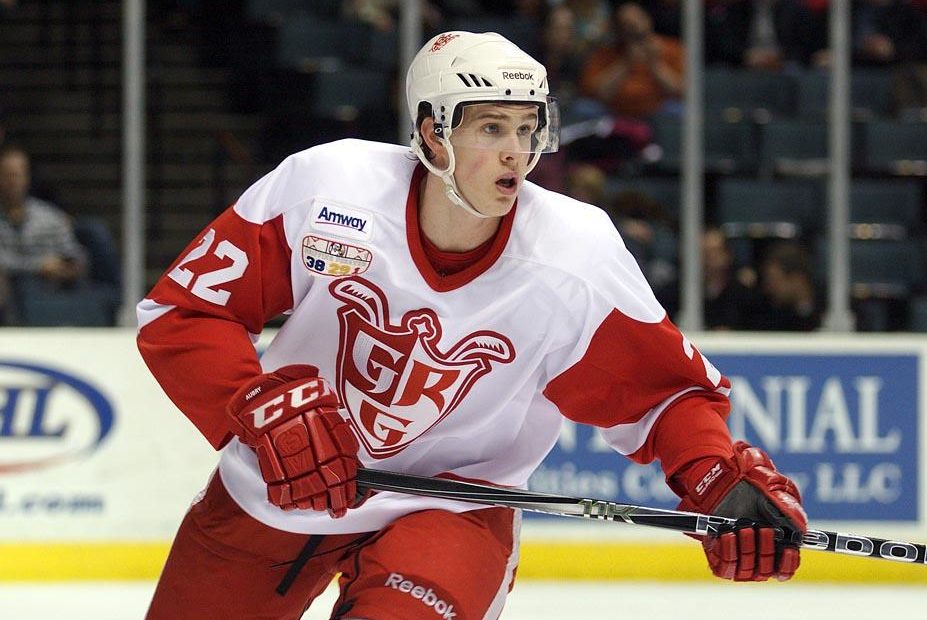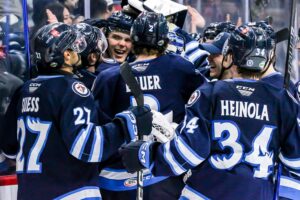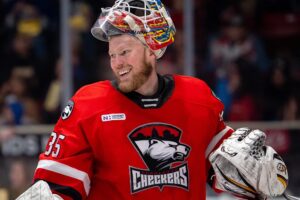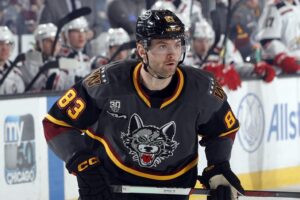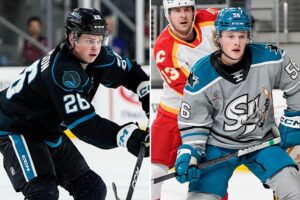by Mark Newman || AHL On The Beat Archive
When you have a father who played in the NHL, you’re around hockey your whole life. Since you were 4 years old, you got to skate with the guys down at the rink and eventually you get used to the atmosphere.
You see the daily routine that your dad goes through and you eventually fall into it and start doing it yourself. You get introduced to the best training and the best equipment. You have all the things that you need to help you become a good hockey player.
Having a dad who played in the NHL puts you ahead of the learning curve and prepares you better for the opportunity to do well. As you’re growing up, you’re gaining valuable experience without even knowing it.
You’re hanging around all these very good hockey players and you learn how to skate, how to play, how to ‘everything.’ In the long run, that’s going to help.
– Curt Fraser, Grand Rapids Griffins head coach
* * * * *
Ray Ferraro knew his second son might someday have a chance to play hockey at the game’s highest level and, if he was going to have anything to say about it, Landon Ferraro was going to excel.
“Landon was a real athletic kid,” said the elder Ferraro, whose first-born, Matt, also liked sports. “Whatever Matt was into, Landon wanted to do it as well. He was a terrific baseball player and a very good soccer player, but he gravitated to hockey pretty early.
“We didn’t push him one way or another. We knew he would figure it out on his own accord.”
As a boy, Landon was encouraged to just play.
“I was free to play whatever sport I wanted,” he recalled. “I loved baseball and soccer, but I knew I enjoyed hockey more.”
Landon decided to pursue the sport that had earned his father a very good living. From 1984 to 2002, Ray Ferraro played 18 seasons in the NHL with the Hartford Whalers, New York Islanders, New York Rangers, Los Angeles Kings, Atlanta Thrashers and St. Louis Blues.
It was a decision that complicated their father-son relationship.
“If he had wanted to be a piano player, it wouldn’t have mattered. I could have given him advice, but he would never need to listen to whatever I said because I didn’t play the piano. Unfortunately, what he chose to play was something that I understood very well.”
Ray Ferraro wasn’t happy when his son wouldn’t listen to his advice, but he understood.
You don’t need to have played hockey – or any sport for that matter – to realize that a teenage son and his father don’t always see eye-to-eye.
“It can be pretty challenging,” said the elder Ferraro. “I remember when I was 15 and I thought I knew everything. Then, as you get older, you realize that your dad wasn’t so dumb after all.”
A father only wants what is best for his son. Just ask Pierre Aubry, who coached his son Louis-Marc Aubry for several years when his boy was growing up.
Like Ray Ferraro, Aubry was a former NHL player, having been a member of the Quebec Nordiques and Detroit Red Wings during the 1980s. But while Ferraro transitioned into the world of broadcasting, Aubry was immersed in coaching, a small detail that might have given him a not-so-little advantage when it came time to teach.
“I don’t know if I was more knowledgeable than other coaches, but Louis-Marc seemed to appreciate my advice,” the elder Aubry said. “I never had any problems with him.”
One headstrong and determined, the other reticent and compliant, and yet both had their sights unequivocally set on following in the footsteps of their fathers.
* * * * *
Landon Ferraro remembers filling water bottles and cleaning visors when his dad was playing for the Atlanta Thrashers and how much he enjoyed hanging around the NHL dressing room.
“I remember going into the room and being very excited,” recalled Ferraro, who was 8 years old when his dad joined the expansion team in 1999. “Every kid wants to go to their dad’s work, and for me that meant I got to play around in a hockey dressing room.
“The rule was that it was a very quick exit from the rink with my mom if they lost, but if they won, my brother and I could go down and fool around in the room. We’d take someone’s stick and go out on the ice and shoot around. It was a pretty unique opportunity.”
Ferraro wasn’t just collecting hockey sticks, although he soon had a bedroom full of them. He was also stockpiling tips, not only from watching his dad in games and practice, but also from the chance to become acquainted with young stars like Dany Heatley and Ilya Kovalchuk.
“It was a fun team because most of them were young,” Landon said. “I got to see Heatley and Kovalchuk come into the league. Heater always treated me really well and always had time to talk to me.”
The elder Ferraro was in his late 30s by the time he played in Atlanta, which gave Landon a glimpse into the mettle and moxie needed to excel in a physical sport like hockey.
“We spent a lot of time at the rink,” Landon said. “We’d get there early so he had time to warm up, and after the game he would be icing things, so there was a lot of time to just hang out, too. I got to see how hard the guys worked and how much they enjoyed it at the same time.”
Looking back now, those days inside the Thrashers’ dressing room provided a glimpse into the future. Ray Ferraro’s coach in Atlanta was Curt Fraser, who would become his son’s first coach in the pros a decade later.
“It’s somewhat comical that it ended up this way, but I know Landon’s in great hands,” Ray Ferraro said. “Curt is competitive, but at the same time he loves working with the young kids. My son’s in a great situation.”
* * * * *
Pierre Aubry’s NHL career was over by the time Louis-Marc was born in 1991. Aubry showed that he could score at will at the lower levels – he tallied 85 goals for the Trois-Rivieres Draveurs during the 1979-80 QMJHL season – but had less success at finding the back of the net in the NHL.
Aubry finished his playing career in Europe before moving into the coaching ranks.
“He doesn’t say a lot about those days, but I’ve heard a few stories,” Louis-Marc said. “His basic advice has always been: work hard and have fun. It always comes down to that.”
The elder Aubry still teaches power skating and coaches young prospects in Quebec. “He sometimes gives me advice, and that’s okay because he knows what it takes to play.”
Louis-Marc started skating very early, before he was even three years old. “He had a lot of fun with the players on my junior teams,” Pierre said. “He’d go on the ice before and after practice. He always loved hockey.”
Hockey became decidedly more difficult for Louis-Marc when he became a teenager. He grew eight inches in four years, stretching his once-compact body to a lanky 6-foot-4 frame.
Finding clothes to fit, however, was the least of his worries. His bones grew so fast that his muscles couldn’t keep up and he was forced to sit out a season.
“I was always one of the smaller players and all of a sudden – boom – I was one of the tallest,” Louis-Marc said. “It was hard – changing my stick length, feeling a bit uncoordinated. Being a late-bloomer was frustrating.”
His father did his best to help him see the forest for the trees.
“When you’re 15 or 16, you don’t care about what something will mean when you’re 20 or 25,” the elder Aubry said. “I had to remind him that he was not as strong as he would be later, that he needed mental toughness now, and that he had to keep working.”
Pierre Aubry knows his son’s size will be a blessing down the road.
“I tell him that if I was 6-4, I’d still be playing,” said the father, who stands 5-foot-10. “Louis-Marc will be a lot stronger in a few years. He needs the time to learn and gain experience.”
* * * * *
Being the son of an NHL player can be a double-edged sword. While the lineage affords some distinct advantages, it can put added pressure on a young player to live up to the name.
Ray Ferraro said it’s a mistake to compare father and son.
“Landon and I are completely different players,” he said. “I was able to score goals (408, including two 40-goal seasons), but that was pretty much the extent of my play. Landon is far more physical and a lot faster, and he’s going to be a much better two-way player.”
Pierre Aubry recognizes some similarities with his son but thinks Louis-Marc has the potential to achieve greater results.
“Louis-Marc has great hands, but he sees the ice a lot better than I did,” he said. “He knows what to do with the puck and has a good knowledge of the game. He can have a career that lasts a lot longer.”
Sons of NHL players, having witnessed the allure of the bright lights, sometimes lack the patience to wait for their opportunity. Like other young prospects, they want to be in the NHL sooner rather than later.
“These kids don’t always understand some of the decisions that are made,” the elder Aubry said. “Having been a coach, I know both sides of the game, so I try to help him stay positive. Life goes by you very quickly – you want to be ready when the opportunity comes.”
* * * * *
The challenge for any father is to find that delicate balance between enthusiastic encouragement and constructive criticism.
As Ferraro says, it’s hard to stay silent when you have something to say.
“You want to help them so badly,” Ferraro said. “But at the end of the day, they’re the ones who are playing the game and who are going to make the mistakes and learn. You want to give them support, but you also have to allow them room to grow.”
Ferraro is the first to admit that he still says too much sometimes. When Landon was 15, the two often butted heads – which is not that surprising given the emotional powder keg the teen years can be.
“He was just trying to help, but I thought he was just being a pain,” Landon said. “There are times when I need his help and other times when I need to figure it out on my own.”
Landon is thankful that he and his father have come to terms with their relationship, and both father and son speak lovingly of the bond they have forged over the years.
“We had to work at making sure that not every conversation was about hockey,” Landon said. “He has so much information to give – he loves the game so much – but sometimes I just need him to be dad.”

































